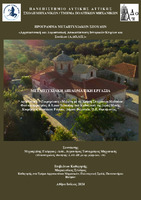| dc.contributor.advisor | Μαμαλούκος, Σταύρος | |
| dc.contributor.author | Μιχαηλίδης, Γεώργιος | |
| dc.date.accessioned | 2024-07-31T08:49:38Z | |
| dc.date.available | 2024-07-31T08:49:38Z | |
| dc.date.issued | 2024-07 | |
| dc.identifier.uri | https://polynoe.lib.uniwa.gr/xmlui/handle/11400/7272 | |
| dc.identifier.uri | http://dx.doi.org/10.26265/polynoe-7104 | |
| dc.description.abstract | Η Παρούσα Διπλωματική Εργασία πραγματεύεται την χωρική και γεωμετρική αποτύπωση, τεκμηρίωση και καταγραφή της Αρχιτεκτονικής, της παθολογίας και των κατασκευαστικών φάσεων του Καθολικού της Ιεράς Μονής Κοιμήσεως Θεοτόκου Ραγίου με τη χρήση σύγχρονών μεθόδων Τοπογραφικής και Αρχιτεκτονικής αποτύπωσης και καταγραφής. Η Ιερά Μονή Κοιμήσεως της Θεοτόκου Ραγίου βρίσκεται στον Δήμο Φιλιατών της Περιφερειακής Ενότητας Θεσπρωτίας στην Περιφέρεια Ηπείρου και είναι κηρυγμένη από το Υπουργείο Πολιτισμού ως ιστορικό διατηρητέο μνημείο σύμφωνα με την Υ.Α. 7828/07.05.1965 (Φ.Ε.Κ. 404/Β/06.07.1965). Το καθολικό της Ιεράς Μονής Κοιμήσεως Θεοτόκου Ραγίου αποτελεί ένα εντυπωσιακό και σύνθετο Αρχιτεκτονικά εκκλησιαστικό οικοδόμημα του τέλους, πιθανότατα, του 16ου αιώνα που έχει υποστεί διαχρονικές επεμβάσεις επισκευών και συντήρησης κατά τη διάρκεια της μακραίωνης ιστορίας του. Οι στόχοι της Διπλωματικής εργασίας ήταν: • Η συνδυαστική εφαρμογή των σύγχρονων μεθόδων Τοπογραφικής, Φωτογραμμετρικής και Laser Scanning αποτύπωσης σε ένα σύνθετο Μνημείο και η συγκριτική ανάδειξη των πλεονεκτημάτων & μειονεκτημάτων των μεθόδων. • Η Γεωμετρική/Αρχιτεκτονική μελέτη του Μνημείου. • Η Καταγραφή της Παθολογίας, Τυπολογίας και των Ορατών Μορφολογικών και Δομικών στοιχείων του Μνημείου.
• Η καταγραφή των εντοπισμένων και ορατών κατασκευαστικών φάσεων και διαχρονικών επεμβάσεων στο υπό μελέτη Μνημείο. • Μια πρώτη προσέγγιση σε προτάσεις συντήρησης/αποκατάστασης. | el |
| dc.format.extent | 297 | el |
| dc.language.iso | el | el |
| dc.publisher | Πανεπιστήμιο Δυτικής Αττικής | el |
| dc.rights | Αναφορά Δημιουργού - Μη Εμπορική Χρήση - Παρόμοια Διανομή 4.0 Διεθνές | * |
| dc.rights.uri | https://creativecommons.org/licenses/by-nc-sa/4.0/deed.el | * |
| dc.subject | Τοπογραφική αποτύπωση | el |
| dc.subject | Φωτογραμμετρία | el |
| dc.subject | Φωτογραμμετρική αποτύπωση | el |
| dc.subject | Laser scanning | el |
| dc.subject | Laser scanner | el |
| dc.subject | Ιερά Μονή Κοιμήσεως Θεοτόκου Ραγίου | el |
| dc.subject | Καθολικό Ιεράς Μονής Ραγίου | el |
| dc.title | Αποτύπωση - τεκμηρίωση - μελέτη με τη χρήση σύγχρονων μεθόδων φωτογραμμετρίας & laser scanning του καθολικού της Ιεράς Μονής Κοιμήσεως Θεοτόκου Ραγίου, Δήμου Φιλιατών, Π.Ε. Θεσπρωτίας | el |
| dc.title.alternative | Survey - documentation - study with the use of modern methods of photogrammetry and laser scanning of the catholicon of the Monastery of the Assumption, Ragio located in the Municipality of Filiates, in the Regional Unit of Thesprotia in Greece | el |
| dc.type | Μεταπτυχιακή διπλωματική εργασία | el |
| dc.contributor.committee | Βαρελίδης, Γεώργιος | |
| dc.contributor.committee | Repapis, Constantinos | |
| dc.contributor.faculty | Σχολή Μηχανικών | el |
| dc.contributor.department | Τμήμα Πολιτικών Μηχανικών | el |
| dc.contributor.master | Αρχιτεκτονική και Δομοστατική Αποκατάσταση Ιστορικών Κτιρίων και Συνόλων | el |
| dc.description.abstracttranslated | The present Thesis deals with and displays the geographic and geometric survey, documentation and register of the architecture, pathology and construction phases of the Catholicon of the Monastery of the Assumption, Ragio, with the use of modern Topographic and Architectural methods of surveying and documentation. The Monastery of the Assumption, Ragio is located in the Municipality of Filiates, in the Regional Unit of Thesprotia, in the Region(Prefecture) of Epirus in Greece. The Monastery is declared as a protected Culture Monument by the Greek Ministry of Culture by the government document ‘Y.Α. 7828/07.05.1965 (F.E.Κ. 404/Β/06.07.1965)’. The Catholicon of the monastery is very impressive and complicated religious Christian temple, in terms of Architecture and Christian iconographic painting. It is estimated, by the Greek ministry of culture, to be built around 16th century (AD). The church has been under many contraction and repair works through centuries. The goals of the present Thesis were: • The combined use of modern Topographic, Photogrammetric and Laser Scanning methods of surveying a geometrically complicated monument, the comparison of these survey methods and the presentation of the pros and cons of each method and the combination of them. • The detailed geometrical/architecture study of the church. • The documentation of the possible typology type and influences, the pathology, the visual morphological elements and contraction materials of the monument.
• The documentation of the construction phases and repair/restore works of the Church through time. • An attempt of basic level restoration proposals. | el |


